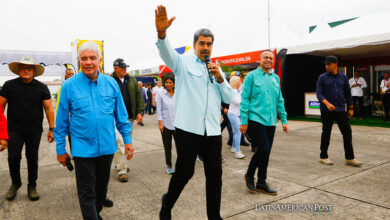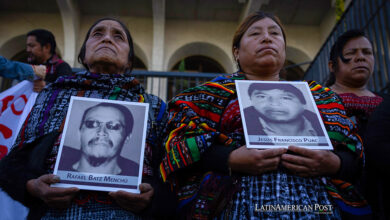Guatemala: Chapina Democracy Survives Despite its Weaknesses
Guatemala's 2023 general elections put the country's democracy to the test as the country seeks an orderly election and transition.

Photo: TW-SandraTorresGUA, TW-BArevalodeLeon
LatinAmerican Post | Luis Angel Hernández Liborio
Listen to this article
Leer en español: Guatemala: la democracia chapina sobrevive pese a su debilidad
After a few critical days, legality has returned to Guatemalan democracy; the parties close to the ruling party denounced irregularities in the elections held on June 25, seeking the nullity and the repetition of the elections. The Supreme Court dismissed the complaints, which allowed the Electoral Tribunal to declare the elections valid, leaving the official candidate Manuel Conde Orellana out of the ballot.
Sandra Torres for the Return of UNE
The National Unity of Hope candidate, Sandra Torres, is responsible for bringing Guatemala's most significant and robust party back to power. Torres was first lady during the government of her then-husband, Álvaro Colom, from 2008 to 2012, she was the front runner in the first round of the June elections but did not reach the percentage to take the victory, but she did reach her third runoff. According to official data, she received 15.8% of the vote, surpassing Bernardo Arevalo, her main competitor, who obtained 11.78%. Far behind both was Conde Orellana, the candidate of President Giammattei, who came in third place with 7.8%.
Guatemalan democracy is still developing. Since 1985 this democratic opening took place, 12 presidents have succeeded each other, and none of them were reelected since there is no such figure in the country's legislation. Only 2 of the 12 presidents belonged to the same party: Jorge Serrano Elías and Gustavo Espina; however, both presided during the same term. Espina remained in power for less than five days after Serrano's dismissal, so it could be considered a single period. Thus, no political party in Guatemala repeated in power. Each president belonged to a different party, some already extinct or acceding to the presidency as independent candidates. Political instability and the weakness of the country's institutions caused the extinction of several parties.
The "Attack" on Semilla
The second round of voting on August 20 is expected to be complicated, between abstentionism and attacks from the ruling party. The Semilla Movement, a party of Bernardo Arevalo, was attacked during the whole campaign, but the most surprising blow was the suspension of the party after entering the runoff. Immediately, the presidency supported the candidates trying to wash their hands, even though the investigation against Semillas came from the Prosecutor against Impunity, under the Attorney General's Office, a position appointed by the president. Arévalo assured trust in the electoral law that prevents the suspension of a party in the middle of an election, in addition to the national and international observers present in the election that exert pressure. After this, the Constitutional Court granted a provisional injunction allowing Semilla and its candidate to continue effectively in the electoral process.
You can also read: The Profile of AMLO's Six Presidential Succession Cards
The Null Vote: "The Rival to Beat"
Guatemalan democracy still has a long way to go. The ruling party headed by President Giammattei was pointed out for hindering the elections, first by sabotaging the registration of opposing candidates, and also for trying to annul the elections by filing a legal appeal that went all the way to the Supreme Court. After several days of questioning, the Supreme Court determined that the Electoral Tribunal could declare the validity of the election in its first round, which gave Sandra Torres of the UNE and Bernardo Arévalo of the Semilla Movement a ticket to the runoff. With this, the continuity of Giammattei's project is discarded, despite his attempt to seek the repetition of the elections.
Of the two candidates, Arevalo is considered progressive, which does not please the government and Guatemalan business people. Likewise, candidates who did not obtain their registrations called the population to sabotage the elections as protests for the problems faced by Guatemala's political and electoral system. As a result, the null vote increased from 4% in 2019 to 17% in 2023, a figure that exceeds what any of the candidates obtained, the level of abstentionism is alarming; if Torres or Arévalo want to preside over the country, they must find a way to convince Guatemalans to trust their electoral system. The appointment for the runoff is in August, after which the country will look for a new orderly alternation.
The Power of Business: The Big Loser
Something that Guatemala inherited from the colonial era is the power of prominent businessmen, some of them still descendants of the Spanish families that founded haciendas and estates older than the country. The Chapín business people have been one of the dominant powers for a long time. The current elections are no exception; Torres' victory would allow them to continue comfortably with direct intervention in the country's main decisions and maintaining governmental support for their interests. Sandra Torres considers herself a businesswoman and assured that she will strengthen legal security for businesses as job creators in Guatemala. She is also one of the candidates who promised to implement measures similar to Nayib Bukele in El Salvador to combat insecurity.
For his part, Bernardo Arévalo, in his progressive character, assured that he would seek the revision of labor conditions in the country and the restrictions to which companies should be subjected. He considers himself anti-corruption, which is one of his banners during the campaign, in contrast to the scandals of the Giammattei government, which is not popular. Just as Sandra Torres is a character linked to power, her father was president of the country in the 50s in a turbulent period. Arevalo promises to transform the country from the ground up, even if this means "tightening the belt" of the business class by limiting their power.




